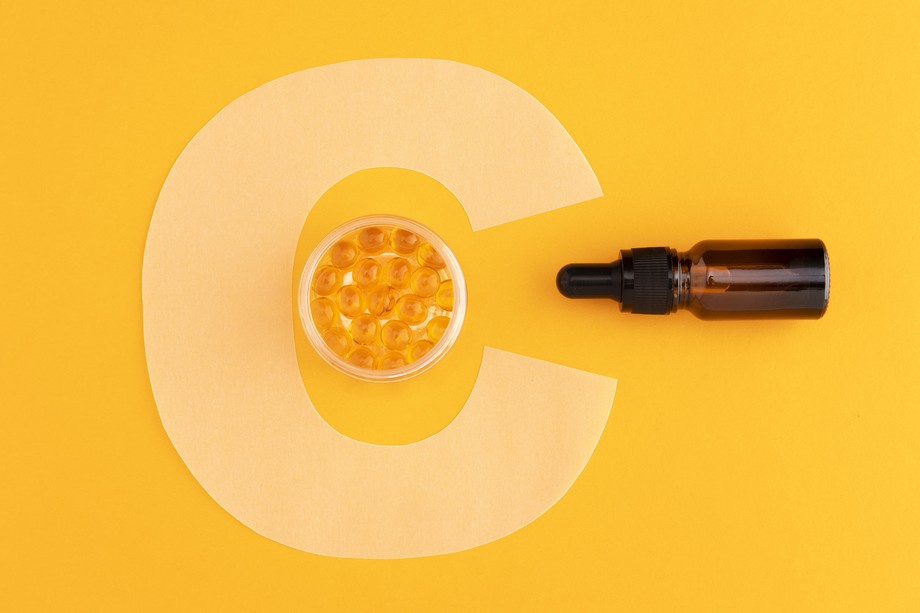Sodium-containing chemicals have found wide applications in the food and pharmaceutical industries. One of the best-known organic sodium compounds is sodium ascorbate. How to take this supplement and where is it used? Here are some highlights.
What is sodium ascorbate?
Sodium ascorbate is the sodium salt of L-ascorbic acid (i.e. left-handed vitamin C). In scientific terminology and in the food industry, this substance is also described as E301 or Sodium ascorbate. Sodium ascorbate combines the function of an antioxidant and an acidity regulator. And how is it created? It is a derivative of the process of bacterial fermentation of monosaccharide (in the form of glucose) and oxidation processes.
Sodium ascorbate resembles table salt in appearance and structure, i.e. white (or yellowish) crystalline powder, odorless. E301 has a brackish taste and dissolves easily in water. In its natural form, it occurs (similarly to vitamin C) in fruits and vegetables, such as citrus, currants, tomatoes and leafy vegetables.
Sodium ascorbate and ascorbic acid
Sodium ascorbate is very often confused with ascorbic acid. Meanwhile, these are two varieties of vitamin C. How do they differ?
- ascorbic acid (E300, L-ascorbic acid) is the common name for vitamin C, sodium ascorbate is a salt of ascorbic acid,
- vitamin C has a higher pH than sodium ascorbate.
Due to the reduced acidity, sodium ascorbate is sometimes a substitute for L-ascorbic acid in some supplements and medications. These are most often products intended for people with gastrointestinal ailments.
How does sodium ascorbate affect health?
How does sodium ascorbate affect the body? As a delicate replacement for L-ascorbic acid, the E301 supplement has a very beneficial effect on all internal organs and improves all life processes. It is thanks to it that we strengthen immunity in the period of colds and recover faster during infections.
What else does sodium ascorbate supplementation give? It is co-responsible for the reconstruction of all body cells. It facilitates the absorption of iron, lowers the level of cholesterol in the blood, clears the veins, prevents the proliferation of pathogenic substances and free radicals.
Sodium ascorbate: application
The sodium salt of L-ascorbic acid finds various applications in everyday life, in chemistry and industry. It is an excellent source of vitamin C, which humans cannot naturally produce in their own bodies. Properly supplemented sodium ascorbate strengthens immunity and accelerates wound healing. It also has anti-aging and anti-cancer properties.
In food technology, the E301 additive has been known and widely used for years in the food industry, confectionery and bakery. It is a high-quality acidity regulator and antioxidant that inhibits the proliferation of bacteria and free radicals. Thanks to it, dishes and food products retain their freshness, color and taste longer.
Sodium ascorbate is also used as a chemical reagent in laboratories and in industry. The antioxidant properties of E301 are also appreciated by the producers of the cosmetics industry - this additive is present in e.g. in lipsticks, creams and nourishing balms.
How to take sodium ascorbate?
Vitamin C and its variety - sodium ascorbate - play a very important role in medicine and dietetics. How to use this powder in daily prophylaxis? Before we reach for any preparation containing sodium ascorbate, consult a doctor or nutritionist. A specialist will tell us how many mg of vitamin a day we should take, taking into account age, lifestyle and existing diseases. We also have an increased need for this ingredient when we are stressed or smoke cigarettes.
However, the human body very quickly loses vitamin C with urine. Appropriate, daily dosage is therefore the only effective way to effectively supplement its permanent deficiencies.
Sodium ascorbate E301: dosage
How much sodium ascorbate can you take per day? The dosage is always an individual matter, as we mentioned earlier. The content of the publication Nutrition standards for the population of Poland and their application , published by the National Institute of Hygiene in 2020, shows that:
- the dosage of sodium ascorbate and ascorbic acid remains an individual matter, depending on age, sex, lifestyle, etc.,
- the average, reference value of vitamin C intake in Poland is 80 mg per day.
And what do the labels of publicly available supplements say about the dosage of sodium ascorbate? According to the manufacturers' recommendations, it is enough to use half a teaspoon of powder per glass of water (200-250 ml) a day.
Is Sodium Ascorbate Harmful?
What else is worth knowing before we decide to introduce sodium ascorbate supplementation? The harmfulness of this compound is insignificant, because we quickly excrete it with urine. However, when consumed in very high doses, the E301 supplement can cause:
- disorders of the functioning of the digestive and urinary systems (diarrhea, abdominal pain, pollakiuria),
- formation of urate stones and oxalate stones.
What Else Causes Too Much Sodium Ascorbate? Side effects resulting from the excess of this ingredient in the human body can be very different and different for each organism. An example of an unusual reaction of the body to excess sodium ascorbate is skin rashes. However, they do not pose a threat to life or health.

